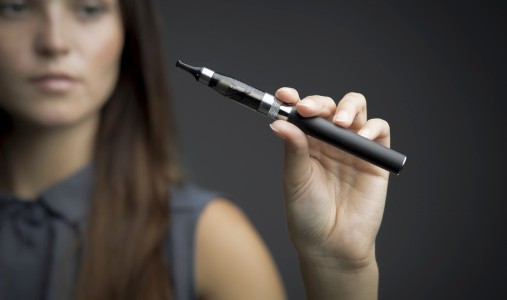VCH plays role in Vancouver’s move to restrict e-cigarettes
The City of Vancouver voted last week to ban use of e-cigarettes in public spaces – to restrict the sale of e-cigarettes to minors and ban displays of e-cigarettes in stores and several VCH staff were key in making this happen. My congratulations goes to Dr. Meena Dawar, medical health officer; Dr. Milan Khara, medical advisor to the VCH Regional Tobacco Program and director of the VGH Smoking Cessation Clinic; Christina Tonella, manager of Regional Tobacco Reduction Program; our tobacco reduction coordinators; and all of our tobacco enforcement officers. Kudos to everyone involved.
Everyone in Public Health works tirelessly to positively influence the many factors that impact our health such as smoking. It’s so rewarding to see our efforts making a difference in the health of our residents.
Vancouver is the first municipality in B.C. to restrict e-cigarettes. Three other Canadian municipalities, Hantsport, Nova Scotia; Innisfil, Ontario; and Red Deer, Alberta have enacted similar restrictions. In the U.S., over 200 municipalities have included e-cigarettes in their tobacco bylaws.
While many people consider e-cigarettes to be safer than tobacco, there are safety concerns primarily stemming from the lack of regulations. Given the large number of products and lack of manufacturing and labelling standards, there is variability between brands. A number of hazardous chemicals have also been detected in e-cigarette vapour, though at lower concentrations than tobacco smoke. The exact effects from long-term exposure remain unclear. While e-cigarettes may play a role in harm reduction by helping smokers quit smoking, but since second hand exposure to non-users is a concern, the products cannot be used in smoke-free areas.
We do not support the recreational use of e-cigarettes by youth. E-cigarette use in public spaces can normalize smoking behaviour for children and youth, and undermines people’s attempts at quitting.
VCH has banned e-cigarette use on our grounds under the Smoke-Free Premises Policy.


Tina
I think that’s wrong move if you are trying to get people to quit smoking. I’ve just started using an e-cigarette, and believe me, it’s nothing like the real thing! So for me, and others I have talked to, it is one step closer to quitting altogether. It’s better for the environment – no butts on the ground, and no toxic second-hand smoke in the air.
Dr. Meena Dawar
Thank you for your comments Tina and for your interest in quitting smoking. We appreciate that you have chosen to use e-cigarettes in your journey to help you cut back and eventually quit smoking. We are not opposed to the use of e-cigarettes by adults for this purpose. Many individuals believe that e-cigarettes may play a role as harm reduction devices by helping smokers ‘transition’ from harmful tobacco to a potentially less harmful e-cigarette device. We understand that there are several trials exploring this role and we look forward to reviewing the results when they become available. In the mean time, VCH recommends evidence based interventions with proven safety records in helping smokers kick their tobacco addiction. VGH Smoking Cessation Clinic is available to staff and the public. We invite you to contact Dr. Khara, the medical director of this clinic, to discuss evidence based options.
While the benefits from e-cigarettes are not yet clear, there are several concerns that need to be addressed. Our primary concern is that these products should not be sold to youth as a recreational device as they have not been proven to be safe. It is clear that e-cigarettes are being promoted as a lifestyle choice. Given the inadequate product labels, youth experimenting with these products could unwittingly end up being addicted to nicotine.
In addition, this product should not be used in smoke free spaces such as public buildings, hospitals, etc because of presence of respiratory irritants and other hazardous chemicals, including cancer causing chemicals similar to tobacco smoke. While exposure to chemicals in e-vapor may be safer than exposure to tobacco smoke for tobacco users, it is important to protect non smokers from exposure to the same chemicals.
You are likely aware that there are nearly 350 e-cigarette devices and over 7000 varieties of e-juice available. Only a small number have been studied. In the absence of regulatory requirements governing production of these devices, along with absence of labeling requirements, users cannot know what chemicals they are being exposed to when they vape. In addition, studies have noted a wide variability in components between products and between lots of the same product. For example, if you are using nicotine containing e-juice, there is no guarantee that you are getting any nicotine or that your e-juice contains the amount of nicotine noted on the label.
Bottom line, the purpose of our collaboration with the City of Vancouver is not to dissuade adults from using e-cigarette devices but rather to regulate their use in smoke free spaces so the vast majority of Vancouver residents (who do not smoke or vape) are not exposed to second hand vapor. We are working to create a regulatory framework around a product and industry that is completely unregulated so that the product is not banned but use in smoke free spaces is not permitted. I suspect that the vast majority of e-cigarette users would also agree that these products should not be sold to minors and now they are not, at least in the City of Vancouver.
Meilan
Well done VCH and the City of Vancouver! I found it most disturbing being on a bus beside people smoking these e-cigarettes.